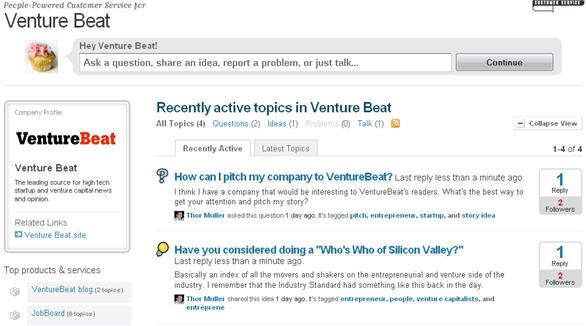[Disclosure: Satisfaction was developed by a team led by Thor Muller, who is an advisor to VentureBeat. We have a close relationship with Thor. Since other sources have started writing about Satisfaction, you should read that too, since we may be biased.]
 Satisfaction is a new San Francisco company that aims to improve online customer service by letting the customers effectively take over the process.
Satisfaction is a new San Francisco company that aims to improve online customer service by letting the customers effectively take over the process.
That’s a controversial mission, given that many companies struggle to handle even simple questions. Remember the controversy at Dell, where customer outrage about shoddy service ate away at the company’s brand, even as Dell’s customer service folks froze like deer in headlights? That company is still dealing with the fallout, and has, woefully late, come to its own conclusion it needs to put customers in charge.
Giving up control can be scary. Satisfaction hopes to show companies the advantages of doing this sooner rather than later.
Satisfaction has yet to launch officially. However, it has started by building a separate page for each company it serves. For example, we’ve been testing a page devoted to VentureBeat, where people can ask things like “How do I publish a contributor’s column at VentureBeat?” Satisfaction lets us respond. However, sometimes, like a big company, we may delay, or not answer it as thoroughly as some would like. Here, veteran VentureBeat readers familiar with our policies may be able to respond more quickly that we can. Satisfaction carries the answer from both ourselves and our readers.
Sometimes there are multiple answers to any given question. Rather than producing a fresh trouble ticket to respond to each customer, the company and user can see if a question is already answered — making the process more efficient.
Some of Satisfaction’s more compelling features will be rolled out in September. One will let users find answers even if the original questions were asked at another company’s site. For example, an Apple user may ask a question about Parallels, a software for the Mac. The best answer may reside at Parallels own site, and so Satisfaction will connect users to those answers.
Also, Satisfaction will soon automate the process for letting companies create a Satisfaction site for themselves. Right now, users must get approval for a new company to be added via Satisfaction’s beta form.
The company offers technology that works around the problem of questions that are very similar, even if phrased differently. For example, if a reader asks, “What are criteria for publishing a contributor’s column?,” Satisfaction would likely provide the same answers as it did to the slightly longer one above. This approach is called “fuzzy matching.” For instance, questions to a retailer may have multiple answers, depending on whether a customer is looking for help about a store on the East or West coast, or whether they are looking for answers to question about girls or guys shoes, for example. Customers indicate which answers they find useful, pushing those answers to the top.
When a company provides an official answer, it goes to the very top of the pile.
Satisfaction gives each question a separate URL. That way, if outsiders find the questions and answers relevant and start linking to them, they become relevant in the eyes of search engines. The hope is, this would push the questions and answers high enough for Google to show them high in its results — providing answers when people simply type in their question into Google’s search bar.
People can pose their questions on other social sites such as Twitter. A Twitter button at on Satisfaction lets them blast their Twitter friends with the question. Satisfaction does this by sending the friends a URL. The friends click on the URL, and are taken to the Satisfaction page to answer the question.
It has a number of sites testing the service, from Pownce to Timbuk2. You’ll see there are pages for things like Foo Camp (see Tim O’Reilly’s discussion about how to get in to Foo Camp), and about specific products (see the strings on Apple products Macbooks and iPhones).
It plans to make money later, for example selling services to companies to help them monitor trends and communicate with customers. First, Satisfaction wants to get an idea of the types of products people are talking about. Advertising relevant to the topics being asked may also be served.
The company is angel funded, and will likely be raising a round in the future. Besides Thor Muller, other founders include Lane Becker, a founder of Web design consultancy Adaptive Path, and Amy Muller, co-founder of Rubyred Labs.


